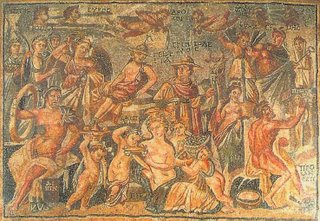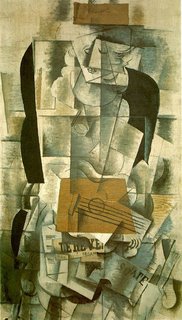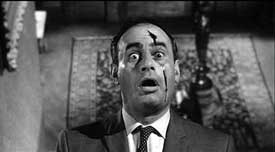Working Notes for an Appendix on Deleuze's Theory of Individuation
 In a beautiful passage from their "Treatise on Nomadology-- The War Machine", Deleuze and Guattari write,
In a beautiful passage from their "Treatise on Nomadology-- The War Machine", Deleuze and Guattari write,Let us take a limited example and compare the war machine and the State apparatus in the context of the theory of games. let us take chess and Go, from the standpoint of the game pieces, the relations between the pieces and the space involved. Chess is a game of State, or of the court: the emperor of China played it. Chess pieces are coded; they have an internal nature and intrinsic properties from which their movements, situations, and confrontations derive. They have qualities; a knight remains a knight, a pawn a pawn, a bishop a bishop. Each is like a subject of the statement endowed with a relative power, and these relative powers combine in a subject of enunciation, that is, the chess player or the game's form of interiority. Go pieces, in contrast, are pellets, disks, simple arithmetic units, and have only an anonymous, collective, or third-person function: 'It' makes a move. 'It' could be a man, a woman, a louse, an elephant. Go pieces are elements of a nonsubjectified machine assemblage with no intrinsic properties, only situational ones. Thus the relations are very different in the two cases. Within their milieu of interiority, chess pieces entertain biunivocal relations with one another, and with the adversary's pieces: their functioning is structural. On the other hand, a Go piece has only a milieu of exteriority, or extrinsic relations with nebulas or constellations as bordering, encircling, shattering. All by itself, a Go piece can destroy an entire constellation synchronically; a chess piece cannot (or can do so diachronically only. (A Thousand Plateaus, 352)This passage pro
 vides an excellent entry point to Deleuze's account of individuation. What Deleuze and Guattari here distinguish are two different perspectives on individuation. On the one hand, there is that account of individuation that sees what individuates the individual as an intrinsic property of that individual. This would be the instance of Chess, where the identity of the pieces belongs to the pieces as such. On the other hand, there is that perspective on individuation that sees individuation not as an intrinsic feature of the individual or as a feature of the individual to be found in the individual itself, but rather as a result of the relations that element enters into. Over the course of a game of Go, the "identity" of the disk changes depending on its relationship to other pieces placed on the board. It can thus be said that the disk, as an individual, is perpetually becoming or is a process. Just as I cannot understand the sense of a statement without knowing its relationship to other statements, the identity of the disk depends on its relationship to other disks.
vides an excellent entry point to Deleuze's account of individuation. What Deleuze and Guattari here distinguish are two different perspectives on individuation. On the one hand, there is that account of individuation that sees what individuates the individual as an intrinsic property of that individual. This would be the instance of Chess, where the identity of the pieces belongs to the pieces as such. On the other hand, there is that perspective on individuation that sees individuation not as an intrinsic feature of the individual or as a feature of the individual to be found in the individual itself, but rather as a result of the relations that element enters into. Over the course of a game of Go, the "identity" of the disk changes depending on its relationship to other pieces placed on the board. It can thus be said that the disk, as an individual, is perpetually becoming or is a process. Just as I cannot understand the sense of a statement without knowing its relationship to other statements, the identity of the disk depends on its relationship to other disks.It would thus seem to be simply a matter of claiming that there are two types of individuations: intrinsic and extrinsic. However, the issue is more complicated than this. As Deleuze puts it,
There is a crucial experience of difference and a corresponding experiment: every time we find ourselves confronted or bound by a limitation or an opposition, we should ask what such a situation presupposes. It presupposes a swarm of differences, a pluralism of free, wild or untamed differences; a properly differential and original space and time; all of which persist alongside the simplications of limitation and opposition. A more profound real element must be defined in order for oppositions of forces or limitations of forms to be drawn, one which is determined as an abstract and potential multiplicity. Oppositions are roughly cut from a delicate milieu of overlapping perspectives, of communicating distances, divergences and disparities, of heterogeneous potentials and intensities... Everywhere, couples and polarities presuppose bundles and networks, organized oppositions presuppose radiations in all directions. (Difference and Repetition, 51)Limitation and opposition are names for representation, and indeed Deleuze and Guattari's point is that Chess functions according to the logic of representation. However, it would be a mistake to assume that there are two types of individuation. Rather, for Deleuze there is only one type of individuation upon which representation is based. Deleuze's central thesis, then, is that difference precedes representation, representation (the logic of identity) does not precede difference. Even the game of Chess presupposes prior differential individuation.
Setting aside any of the political or ethical implications that might follow from treating difference as prior to identity, the first question that naturally emerges is that of what ontological problem might motivate this thesis. Isn't it obvious that there cannot be difference without identical terms to differ from one another? Doesn't representation or the logic of identity adequately account for individuals? Presumably it is uncontroversial that there are individuals. So what is it about the logic of identity and representation that fails to account for individuals. Apart from his argument that the logic of representation fails to give us a concept of difference, but rather inscribes difference in the concept or identity (is this really a problem or is it a convincing way of formulating the problem?), the problem here turns out to be very simple. As Deleuze puts it, "Qualitative or extensive interpretations of individuation remain incapable of providing reasons why a quality ceases to be general, or why a synthesis of extensity begins here and finishes there" (DR, 247). On the one hand, the qualitative, I take it, refers to the logic of predication. If I say "Socrates is a man", I've predicated a quality of Socrates but I have not articulated what makes Socrates "Socrates" or how Socrates differs from other men. I can multiply predicates to my hearts content, striving to find the Socratesness of Socrates in his "accidental qualities", such as having a stub nose, being such and such a height, etc., but all of these qualities remain general. The individual qua individual still remains something that these general qualities are not. We thus have not accounted for what is unique to this individual or what the individual contributes to its individuation.
On the other hand, one of the classic ways of individuating individuals is to point out that no two identities can occupy the same place at one and the same time (individuation through extensity). Yet once again, we fail to give a positive account of the individual qua individual, but again resort to the negative. This time negativity appears in relation to the entities that this individual is not or which do not occupy this place. This, for instance, is how Hegel's account of individuation proceeds in his discussion of "being-there" in the Science of Logic.
I had planned to write a longer post on Deleuze's theory of individuation and the problem that motivates it, but as it turns out my mind is mush this evening, so I decided, instead, to throw out a passage from Difference and Repetition and make a few comments about it. In an amazing passage, Deleuze writes,
Difference is not diversity. Diversity is given, but difference is that by which the given is given, that by which the given is given as diverse. Difference is not phenomenon but the noumenon closest to the phenomenon. It is therefore true that God makes the world by calculating, but his calculations never work out exactly, and this inexactitute or injustice in the result, this irreducible inequality, forms the condition of the world. The world 'happens' while God calculates; if the calculations were exact, there would be no world. The world can be regarded as a 'remainder', and the real in the world understood in terms of fractional or even incommensurable numbers. Every phenomenon refers to an inequality by which it is conditioned. Every diversity and every change refers to a difference which is its sufficient condition. Everything which happens and everything which appears is correlated with orders of differences: differences of level, temperature, pressure, tension, potential, differences of intensity... Every phenomenon flashes in a signal-sign system. In so far as a system is constituted or bounded by at least two heterogeneous series, two disparate orders capable of entering into communication, we call it a signal. The phenomenon that flashes across this system, bringing about the communication between disparate series, is a sign. (DR, 222)The first lesson to be drawn from this passage, I think, is that Deleuze cannot be adequately be described as an empiricist after the fashion of Hume, no matter how attractive and seductive such a temptation might be given the great difficulty of Deleuze's texts and the relative simplicity of Hume. Classical empiricism is an epistemology premised on the primacy of the given (impressions) and their diversity (the variety of impressions), whereas Deleuze is clearly trying to account for something deeper and more fundamental than the given or the principle by which the given is given. Put differently, what Deleuze calls "the being of the sensible" cannot be equated with what Hume calls the "sensible" or "lively ideas". Indeed, were Hume confronted with a position such as Deleuze's, he would denounce it as metaphysical garbage as the empiricist principle councils us to only accept those ideas that can be traced back to the immediate givens of experience.
What Deleuze likes about empiricism, I think, is its emphasis on the individual or its rejection of universals and a priorism, but no matter how tempting it might be, I think it should never be forgotten that Deleuze is putting forward an ontology designed to account for the individuation of the individual, not an epistemology or theory of knowledge that claims skepticism with regard to our ability to know laws and universals. That is, Hume doesn't reject the thesis that there may be causality or that there may be universals, but rather argues that we are unable to know such things by virtue of our inability to make valid inductions to the universal and necessary from a necessarily finite sampling of instances.
Deleuze's central thesis throughout Difference and Repetition-- a thesis he never rejected, as far as I know --is that individuation precedes the individual. That is, the individual is a product of its process of individuation. It is this process that Deleuze's account of indi-drama-different/ciation is designed to account for. Individuation is here understood as a process, rather than something that is already there in the individual. The "indi" of course, refers to "individuation". "Dramatization" refers to the spatio-temporal dynamisms or what Deleuze calls "intensities" that preside over the course of actualization. "Differentiation" refers to virtual multiplicities that distribute differential relations along with their singularities (potentialities), and which share no resemblance to the actualized individual (I need to write far more about this). Deleuze refers to the domain of differentiation as the domain of problems. And differenciation refers to the actualized individual, or species and parts. Deleuze's thesis is that in the course of actualization, the problem resolves itself and cancels difference by equalizing the inequalities that characterize intensity. That is, there is a movement from the intensive realm of the unequal, to what Deleuze calls the realm of diversity, the given, or the actualized world of extensity. In this process the inequality or insensity that presided over the individuation of the individual disappears or is cancelled. Actualization takes place through the equalization of intensities or inequalities, that are always going to be unique to the field in which processes of individuation are taking place. As such, each individuation is going to be a creation within being, even if their results resemble one another from the standpoint of the actualized entity. Deleuze describes these individuals as "signal-sign" systems as there's a communication between the actualized individual and the interiorized difference and problematic field (the heterogeneous series) and intensity that it continuously communicates with in the process of its ongoing individuation. The heterogeneous series are the virtual dimension of differential relations and their singularities and the extensity of the actualized entity, while the "sign" is the intensity that flashes between the two functioning as a spatio-temporal dynamism presiding over this actualization.
This thesis neatly allows Deleuze to account for the transcendental illusions of representation or the logic of identity. Identity isn't an illusion produced by a mind that is somehow independent of an object. Rather, identity is an illusion produced in and through being itself over the course of actualization. The problematic field and its intensities that are the condition for the actualization of the individual are covered over in the course of actualization. This point can easily be seen through a few examples. If we take the example of an icecube, the individuation of this icecube consists in a transition from water to ice. The "problem" or multiplicity in this example will be the molecules that compose the water, whereas the intensity is going to be the temperature. Deleuze is quite liberal with his use of the virtual, applying it to everything from all the drops of water in the ocean when he discusses Leibniz, to atoms, to genes. Ice is differenCiated by equalizing this intensive difference among the water molecules, activating certain potentialities, and thereby producing an actualized extensity in the form of the ice (presumably other intensive factors such as surface tension and resistance, etc., would apply were we to take into account the icetray, air pressure, and so on). The point is that the temperature or intensive factors disappear when we examine the icecube itself... It's nowhere to be found in the individual itself, though it was the sufficient reason for the production of the icecube. What Deleuze is able to account for by distinguishing the individual from the individuation is thus the specificity of this individual here on the basis of the process by which it came to be and its ongoing process of individuation in its capacity as a signal-sign system (the temperature must be maintained for it to maintain this actualized state).
This is a perfectly banal example and I only offer it to give a clear and readily accessible example of what Deleuze is trying to get at with his account of (indi)different/ciation. A more interesting example can be drawn from a slip of the tongue. For instance, recently in a psychoanalytic session, when going on about my inability to write or to bring projects to completion, believing my ideas to be pedestrian and conceiving myself to exist in an institutional setting where there's no place for me save writing commentaries, I also went on about how I keep obsessively returning to the same themes, thinking I'm discovering them for the very first time, only to find that I wrote something in nearly identical terms five or six years ago. In the process of this frustrated rant, I went on to talk about the temporal paradox of repeating, of not being able to have all my thoughts or "my system" in mind at once, and how each repetition already becomes different from what preceded as my enunciations take on different meaning due to new experience that I've had each time I repeat them. In moaning about this I said "I can't be before myself". Of course, by this I meant that I can't have my thought right there in front of myself like I might survey a venn diagram or a mathematical equation. Yet this expression is also a double entendre, or even a triple entendre. On the one hand, it could be taken to mean that I can't be prior to myself, or that I have a fantasy of engendering myself, creating myself, of having no influences. Yet on the other hand, it could more significantly mean that I can't be for myself (and indeed, I often have dark fantasies of doing something that thoroughly ruins me, which intrude in my thought against my will and cause me a good deal of anxiety). In other words, this slip of the tongue could be expressive of being against myself... If I can't be for (before) I must be against myself. No doubt I use this fantasy as a way of maintaining my desire, for by seeing no place for myself in the world of continental philosophy, I don't bother to revise the things I've written and therefore don't publish more material, thereby allowing myself to sustain the belief that in another universe there could be a place for me or that perhaps I'll finally get a grand idea that will "be for" (before) me, while also perpetually deferring such an act as it would ultimately be dissatisfying... Or something like that.
This bit of speech is, of course, an event and an individual of sorts. If we look to the expression itself for its identity or principle of sufficient reason, we would look among the words to find what it signifies. However, drawing on Freud's account of the primary process, such a slip of the tongue is produced by a differential field (what he describes as the neurological system in his Project essay) populated by energetic disparities among neuronal connections (the famous libido) that resolve themselves by actualizing themselves in a symptom (here the slip of the tongue) that allows for an outlet or dissipation of these inequalities. This individual statement is what it is by virtue of this differential field (the unconscious) and the intensities that animate it. If transcendental empiricism is anything, then it is that ontology that seeks to account for the given on the basis of the inequalities that condition and give it. This would be an approach that applies to social phenomena, physical phenomena, persons, biological systems, ecosystems, works of art, and so on. Everywhere there will be unique differential or problematic fields, along with animating intensities or inequalities functioning as spatio-temporal dynamisms presiding over differentiation or the functioning of different signal-sign systems and functioning as their sufficient reason. Not only does the individuation precede the individual, but the individuation precedes that species (for which Deleuze praises Freud and Darwin) in that individuals do not instantiate species, but rather species are aggregate effects of individuals in a population undergoing similar processes of individuation (environmental factors, genetic factors, developmental factors, and so on). Each individuation will be a unique event in that the intensities presiding over individuation never belong to one and the same differential field and therefore face different inequalities to resolve (hence one of the reasons that genetics are not determining... At most, genetics only outline one, among many, fields of potentiality).
What interests me most in Deleuze's remark about the unequal is that the remainder or unequal is never completely eradicated. That is, each cancellation of difference or intensity produces further inequalities that activate the potentialities of a system in new and different ways. Putting the issue in terms of "adaptation" (which is perhaps unwise as it indicates an environment is there in itself, present-at-hand, and that the individual must simply conform to this environment passively), individuals must adapt to their adaptations, or rather, each new actualization further complicates the field and generates new differential fields and intensities. It take it this is the meaning of the eternal return. How, then, are these concepts to be put to work? And how do they transform the way in which philosophy is conceived. At the very least it is clear that thought itself is an individuation, and any talk of foundations or origins already ignores individuation.





















